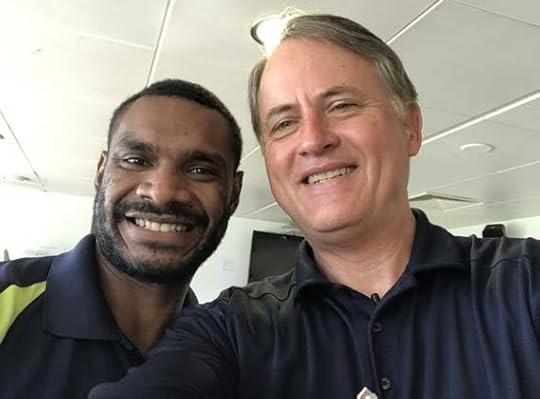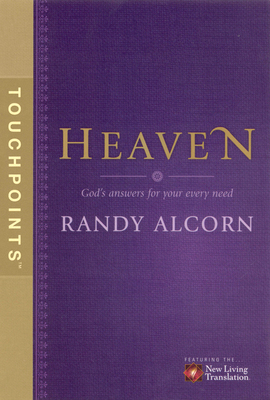Randy Alcorn's Blog, page 130
August 4, 2017
Will We Maintain Our Own Identities in Heaven?

You will be you in Heaven. Who else would you be? If Bob, a man on Earth, is no longer Bob when he gets to Heaven, then, in fact, Bob did not go to Heaven. If when I arrive in Heaven I’m not the same person with the same identity, history, and memory, then I didn’t go to Heaven.
The resurrected Jesus did not become someone else; He remained who He was before His resurrection: “It is I myself!” (Luke 24:39). In John’s Gospel, Jesus deals with Mary, Thomas, and Peter in very personal ways, drawing on His previous knowledge of them (John 20:10-18, 24-29; 21:15-22). His knowledge and relationships from His pre-resurrected state carried over. When Thomas said, “My Lord and my God,” he knew he was speaking to the same Jesus he’d followed. When John said, “It is the Lord,” he meant, “It’s really him—the Jesus we have known” (John 21:4-7).
If we weren’t ourselves in the afterlife, then we couldn’t be held accountable for what we did in this life. The Judgment would be meaningless. If Barbara is no longer Barbara, she can’t be rewarded or held accountable for anything Barbara did. She’d have to say, “But that wasn’t me.” The doctrines of judgment and eternal rewards depend on people’s retaining their distinct identities from this life to the next.
Bruce Milne writes, “We can banish all fear of being absorbed into the ‘All’ which Buddhism holds before us, or reincarnated in some other life form as in the post-mortem prospect of Hinduism. . . . The self with which we were endowed by the Creator is his gift of life to us, the self whose worth was secured forever in the self-substitution of God for us on the cross, that self will endure into eternity. Death cannot destroy us.”[i]
Some people read “you may participate in the divine nature” (2 Peter 1:4) and imagine that we will all become indistinguishable from God. But to imagine we’ll lose our personal identities is a Hindu belief, not a Christian one. The verse in 2 Peter means that we’re covered with Christ’s righteousness. We’ll participate in God’s holiness yet fully retain our God-crafted individuality.
Our own personal history and identity will endure from one Earth to the next. “‘As the new heavens and the new earth that I make will endure before me,’ declares the Lord, ‘so will your name and descendants endure’ ” (Isaiah 66:22). Jesus said to His disciples, “I will not drink of this fruit of the vine from now on until that day when I drink it anew with you in my Father’s kingdom” (Matthew 26:29, emphasis added). The same Jesus will drink the same wine with the same disciples. It isn’t that what used to be us will commune with what used to be Abraham, Isaac, and Jacob. Rather, we, the same people but fully cleansed, will eat at a table with the one and only Abraham, Isaac, and Jacob (Matthew 8:11).
In Heaven will we be called by our present names? The names of God’s children are written in the Lamb’s Book of Life (Revelation 20:15;21:27). I believe those are our earthly names. God recognized as valid the names Adam gave the animals. God calls people by their earthly names, the names given by their parents. He calls people in Heaven by those same names—Abraham, Isaac, and Jacob, for instance. The names of the twelve sons of Israel and of the apostles, apparently the same names we know them by, are written on the city’s gates and the foundations of its walls (Revelation 21:12-14). Our names reflect our individuality. To have the same name written in Heaven that was ours on Earth speaks of the continuity between this life and the next.
In addition to our earthly names, we’ll receive new names in Heaven (Isaiah 62:2; 65:15; Revelation 2:17; 3:12). New names don’t invalidate the old ones. Many people had multiple names in Scripture: Jacob is also Israel; Simon is also Peter; Saul is also Paul.
Imagine a beautiful rose garden. It’s been perfectly designed and cultivated. But the rose bushes become diseased. The garden becomes a tangled mass. It’s a sad, deteriorated remnant of the glorious garden it once was. Then the gardener determines to reclaim his garden. Day after day he prunes, waters, and fertilizes each bush. His desire isn’t simply to restore the garden to its original beauty; it’s to make it far more beautiful than ever.
When the gardener is done and the roses are thriving, beautiful, and fragrant, is the rose garden the same as it was? Is each individual rose the same? Yes and no. It’s the same rose garden, restored to its previous beauty and beyond. Yet to look at it, it’s hard to believe these are the same roses that were once a withered, tangled mess.
This is a picture of Creation, Fall, and Resurrection. When God is finished, we’ll be ourselves without the sin—meaning that we’ll be the best we can be.
For more answers to questions about eternity, see Randy's book Everything You Always Wanted to Know About Heaven as well as his comprehensive book Heaven and devotional 50 Days of Heaven.
[i] Bruce Milne, The Message of Heaven and Hell (Downers Grove,Ill.: InterVarsity, 2002), 194.
Photo: Pixabay
August 2, 2017
Encouragement to Men to Study the Bible and Theology, and Find Great Happiness

Many Christian men would agree that they’re experts in business, hunting, fishing, football, or cars. Sadly, however, even those who attend Bible-teaching churches may know very little about the Bible and theology. (Everything I talk about in this blog pertains to women also, but I know more women than men who study God’s Word, and I believe men are missing out on joy and happiness as a result.)
Why? It’s simple. Every week, men invest hours watching sports and listening to radio talk shows. They visit car dealerships, read car repair manuals, and spend extended time under the hood. They go fishing or hunting. None of these activities is sinful, but any and all can dominate our spare time and the thoughts that occupy our minds. We’re all experts in what we do and think about, and novices in everything else.
Suppose men dedicated even half the time invested in those activities to reading and listening to the Bible and great Christian books. What if they took half the time now devoted to political talk shows and hobbies and invested it in learning solid Bible doctrine? Soon they could converse theologically with as much knowledge and pleasure as they can about sports, hunting, fishing, cars, or politics. And the activities they engage in will be that much more happiness-producing because they’ll know better the one who made all these other pastimes possible! Put God first, and everything else falls into place.
We all talk about what we know best—what’s most important to us. That means we need to change what’s important to us by investing more time in it.
How many men have frequent God-centered conversations today—with each other, their wives, and their children? How much pleasure and happiness are we depriving ourselves of by talking about everything except what matters most?
Calvin Miller lamented, “Never have there been so many disciples who did so little studying. . . . Our day is plagued by hordes of miserable Christians whose pitiful study habits give them few victories and much frustration. Serious students will develop dynamic minds and a confident use of the gifts God has given to them.”[i]
Excerpted from Randy's book Happiness.
[i] Calvin Miller, The Taste of Joy: Recovering the Lost Glow of Discipleship (Downers Grove, IL: InterVarsity Press, 1983), 18.
Photo by Julentto Photography on Unsplash
July 31, 2017
Why I Love Not Receiving a Cent of the Royalties from My Books

Most writers won’t sell a lot of books. But I encourage those Christian authors who do sell a large number to give away most or all of the royalties to God’s kingdom, and to recognize they belong to Him. (Of course, you could only give away all those royalties if you have another job that pays your living wage, as not all, but a good number, of bestselling writers do. If writing is all you are paid to do, then obviously you have to live on some of that income, and there’s nothing at all wrong with that!) One of my heroes, C. S. Lewis, gave away the majority of his royalties to the needy. There are many good reasons for this—including the temptations that receiving large amounts of money can present, as well as the joy to be found in giving.
This idea applies not only to writers who have other jobs, but also to those who have second incomes they don’t need to live on. One example might be when one spouse makes enough to live on, and the other spouse’s income, whether part-time or full-time, can be given away. In such situations, instead of serving to raise your standard of living, the other job can serve to raise your standard of giving.
Some authors I know, who make a living by their writing, choose certain books and say, “100% of those royalties will go to God’s work.” Some business people own more than one business and say, “100% of the profits from that particular business will go to world missions or famine relief.” I know one author who has done that and the book she chose is by far the bestselling book she’s ever written. And sometimes those businesses given over to God’s kingdom work also thrive. Perhaps God has an extra motivation to make that happen when His people make those decisions.
John Piper, the bestselling author of more than 50 books, gives away all the royalties from his books. (To clarify, John is paid a good wage by Desiring God, just like I am by our ministry. So both of us aren’t giving away everything, but are giving away our royalties.)
Desiring God made a video of John explaining where those royalties go. I love John’s heart, and the joy that he receives from giving is evident:
Like John, I’ve experienced the sheer happiness of giving away funds to further God’s kingdom. All the royalties from my books go directly to our ministry, Eternal Perspective Ministries (which gives 90% to worthy Christian organizations and uses the other 10% to help offset costs related to the writing/researching/editing of the books and to facilitate book donations to people all over the world). By God’s grace, to date we’ve given away nearly $8 million to fund missions, feed the hungry, sponsor prolife causes, and much more. Here are just a few of the projects EPM has supported this year:
Mercy Ships: medical outreach to Benin on the Africa Mercy
Joni & Friends: “Wheels for the World” Cuba
SAT-7: Middle East “Because I am a Woman” TV program
CRU: Syria crisis
Because all the royalties go to kingdom causes, I’m not tempted to spend on myself the money God has graciously entrusted to me. Instead, Nanci and I get to give them away and rejoice as we make eternal investments in God’s powerful work around the world. Greed is kept in check, because our lifestyle doesn’t go up if a book commands a greater advance or higher royalties. It’s just more money for the work of the ministry. When I see my books on the bestseller list, I figure, “Maybe the Lord wanted more money for missions work.”
I don’t go to bed at night feeling I’ve “sacrificed” that money, wishing somehow I could get my hands on it. I go to bed feeling joy, because there’s nothing like giving. For me, it is like the joy of leading someone to Christ.
No matter our occupation, each of us has a responsibility to faithfully steward the money God has entrusted to us. May we all be found faithful—and experience the deep, overflowing happiness of giving!
“You must help the weak, remembering the words of the Lord Yeshua himself, ‘There is more happiness in giving than in receiving’” (Acts 20:35, CJB).
July 28, 2017
Our Time Aboard Operation Mobilization’s Ship, Logos Hope

Earlier this month, Nanci and I returned from a trip to Jamaica, where I spoke at a conference with OM Ships International, centering on the wonderful ministry of the current ship Logos Hope.
Here’s a video of our welcome onboard when we arrived with others from the conference to visit the ship.
Following the conference we were privileged to spend five nights on Logos Hope. I’ve written before about the ship, but wanted to share more after we experienced this ministry firsthand.
 We went to nearly every deck and area of the ship while there. We met many of the crew of 400, most of them 18 to 25 years old, a number of whom, I was happy to discover, said they had read or were reading my books.
We went to nearly every deck and area of the ship while there. We met many of the crew of 400, most of them 18 to 25 years old, a number of whom, I was happy to discover, said they had read or were reading my books.
As great as it was to visit the ship a few days while I was speaking at the conference (and staying at an amazing hotel) the real highlight was actually staying those five days on the ship! It was great going to the huge onboard bookstore, called a “book fair,” and fun seeing adults looking at my books. But nothing compared to seeing Jamaican children flipping through the pages of my graphic novels, Eternity and The Apostle!


Our room was on deck eight of nine, and to our delight there were children playing in the narrow hallway. Some crewmembers live with their families on board. The children have their own school and teacher. Some of them have lived on the ship for years, and what a life: surrounded by the young volunteers on the ship, having people of countless tribes and nations and languages come on board, and getting to go ashore and meet others, including children, in every port. It’s truly remarkable.
Nanci and I were struck by the large number of children visiting the ship.
We watched them come aboard, visit the bookstore, buy many books very inexpensively, hear the Gospel presented, and hang out in the International Café.

Sitting with the crew and talking at meals was a unique experience. I would be speaking with a young man from Russia, while sitting next to a girl from Zimbabwe, and meet another from the Faroe Islands, greet a young man from China and another from Iraq, be called to a table to speak with a woman from Guyana, and on and on. I just mentioned six countries, which means I left out about 54 others represented among the crew! The vitality of the crew members, both young and older, was striking.
We thoroughly enjoyed talking to them about their countries, and I loved the pride they took in their homelands. We talked about God’s Word, about their walks with Jesus, and what they were learning going around the world serving on the ship. Some of them go out in the cities where they dock to serve the communities, by building playgrounds, providing eye tests and reading glasses and dental care, distributing medical and food supplies, renovating clinics and orphanages, and much more.
By God’s grace, I have been in many countries and witnessed incredible ministries. But Nanci and I were touched as deeply by what we saw on Logos Hope as we have ever been anywhere in our lives. George Verwer, the founder of Operation Mobilization, is a dear friend, and he is the man who God gave the vision to launch the first OM ship in 1970. George and many others have talked to me about the ships over the years, but never did I realize the breadth and depth and kingdom-shaping quality of this ministry until we witnessed it firsthand. We were blown away by the work of God’s Spirit.
In the picture below, I'm with my friends George Verwer and Karen Coleman. Karen is on the EPM staff. Her son Zac served two years aboard Logos Hope.

Here’s a brief video I filmed of a young crew member telling a story of people coming to Christ after she shared with them, when she didn’t know their language and they didn’t know hers!
The original Logos ship launched in 1970, followed by Doulos, Logos II, and then Logos Hope, by far the largest of the ships. The OM ships have been to 151 countries, and cumulatively, over 46 million people have come aboard them. Logos Hope has had over six million visitors since it launched, visiting 135 ports in over 60 different countries. Close to seven million books have been purchased onboard, and many more given away. It has sailed about 90,000 nautical miles, enough to circumnavigate the globe more than four times!
If you want to see a record of where the ships have been since 1970, click on each of the ships and look at page after page of the ports they’ve visited. There’s no way to calculate how many millions of people have been reached by the ships, and how many have come to faith in Christ, been discipled and grown in their faith, and received Bibles and been equipped with great books.

The stories of changed lives they do know of are marvelous. One that sticks with me is a man who boarded Logos Hope, and shared that many years before when “the book ship” came to his country, he came onboard and stole a Bible. He read it and his life was transformed by God’s Spirit. He became a pastor and has shared the Gospel with countless people. (Needless to say, they didn’t ask him to return the Bible!)
Logos Hope is certainly not a cruise ship (not that those are bad). It’s a missions ship. While we’ve never been on a cruise ship, we were docked near a couple of them, and saw the people unloading at Montego Bay. We’ve heard stories of the food and accommodations on cruise ships, and in comparison Logos Hope is somewhat austere, and the food, while nourishing, is not what draws people to fine restaurants. Everything is on a budget, and nothing is luxurious. The dollars spent to support this ministry are stewarded carefully; yet, there is a spirit of grace, freedom, and joy.
Nanci and I enjoyed our meals and were comfortable and grateful to be onboard. Being surrounded by these multinational young people, we thought of the day when we will sit at banquet tables in the presence of our Lord (Isaiah 25:6; Matthew 8:11). We will hear stories of people from all around the world redeemed by the blood of the Lamb and drawn to Jesus by the Holy Spirit’s work. We at EPM are honored to support Logos Hope by donating royalties and books. We look forward to meeting in Heaven those saved through the ship’s ministry in Jamaica and 150 other countries to which the ships have brought the Gospel.
Everywhere we went in Jamaica, on streets and in shops and taxis, people called Logos Hope “the book ship.” Here’s an article from a Jamaican newspaper, showing many pictures of the ship’s visits to Kingston and Montego Bay. The warmth and respect you sense in the report is commonly felt by people who see the ship as a beacon of light. It brings the hope and love of Jesus and the good news of eternal life, as well as substantial help to their communities.

One evening, the crew members converted the theatre into a dining room for those attending the conference, and served us a wonderful dinner. Then they performed part of The Lion, the Witch, and the Wardrobe drama they’ve been doing in every port. What an incredible ministry.

Here is a video of some of the crew worshiping Jesus with all their hearts.
We made such great friends on the Logos Hope and walked away wanting to tell any young person with a heart to serve God and a desire to see the world to consider signing on for two years as a crewmember! You will become a “world Christian,” see God at work, help the needy, serve people of many nations, and gain lifelong friends from all over the world. It’s not easy, but it’s enriching and strategic and God-honoring, and you will never be the same.
Sidenote: an added bonus was that I got into the warm ocean and snorkeled for hours, enjoying the beauty of God’s underwater creation and taking photos. Here’s a lionfish.

I stuck my head into a cave to get a photo of this giant pufferfish.

Okay, back to this ministry: one of the things I’ve noticed over the years is that Operation Mobilization is a great asset to other ministries. While some crewmembers will end up serving with OM the rest of their lives, many will serve with other missions groups and churches worldwide. Logos Hope is a missions incubator that raises up young missionaries, and seeds them all over the world. Those who go on to work secular jobs will pray and give and serve their churches with a devotion to missions.

Want to see the essence of the Logos Hope distilled down to 90 seconds? Here it is.
And check out this great 2-minute video about Operation Mobilization. Seriously, you’ll be glad you did.
At the conference where I spoke, they raised commitments of about $1.5 million for OM Ships. But that’s just a beginning. They will need that much more to fund the ship’s long voyage for 2018-19, which will go all the way around Latin America. Here’s more from them about their plans and needs:
Since Doulos was in South America in the late seventies and early eighties, we’ve seen a steady flow of Latin Americans joining OM, both on board with OM Ships and in other mission fields around the globe. God has used OM Ships as a catalyst to launch His message to the least-reached people around the globe. We are asking God to make the Ship Ministry the catalyst to inspire a new and unprecedented wave of Latin American missionaries to reach the world’s least reached.
Logos Hope needs ‘seed’ funding of $3 million to initiate our Latin ministry. One third of our operating expenses are funded through book sales but restocking our inventory of books on board in Portuguese and Spanish is a formidable challenge. As Logos Hope sails to Latin America we anticipate that tens of thousands of people will be blessed with the availability of quality books and Bibles. Study reference books for pastors, Christian growth books for adults, children’s books, Bibles at prices all can afford, and educational resources are just a sample of what will be available.
While visiting the ship, people will hear the Gospel of Jesus proclaimed and receive free Christian literature as they exit. Our bold vision for Latin America is that Logos Hope will be the catalyst needed to help OM Latin America send out 2,000 well-prepared missionaries to countries least reached with the gospel over the next decade.
There are several ways to be a part of this eternity-changing ministry:
I highly recommend you subscribe to their email newsletter.
You can pray for the Logos Hope and sign up to receive daily prayer requests by email.
If you’d like to support their ministry, you can give online.
Nanci and I came away with a wholehearted commitment to do what we can for the crew and for the mission of the ship. We are making efforts to purchase and donate, and in some cases possibly print, a large quantity of my books in Spanish and Portuguese (which is the language of 211 million people in Brazil, who comprise about one third the population of Latin America). If you’d like to help fund the purchase or printing of my books for the ship, we would be deeply grateful for your partnership. You can donate online and select the “Books for Logos Hope Fund.”
Spanish:

Portuguese:

Let me wrap it up this way.
 Time and time again on Logos Hope I sensed the powerful work of the Holy Spirit, and tears came to my eyes. The ship is like a microcosm of the global body of Christ. Worshipping with the crew is worshipping with citizens of our true and common country, Heaven (Philippians 3:20).
Time and time again on Logos Hope I sensed the powerful work of the Holy Spirit, and tears came to my eyes. The ship is like a microcosm of the global body of Christ. Worshipping with the crew is worshipping with citizens of our true and common country, Heaven (Philippians 3:20).
When I spoke to the crew, and looked out at all those happy, Christ-emoting faces from so many races and nations, I thought of this passage about God’s people in Heaven:
They sang a new song, saying:
“You are worthy to take the scroll
and to open its seals,
because you were slain,
and with your blood you purchased for God
persons from every tribe and language and people and nation.
You have made them to be a kingdom and priests to serve our God,
and they will reign on the earth.” (Revelation 5:9-10)
A wonderful young brother from Papua New Guinea:

Have you ever heard someone say, “That was a taste of Heaven”? Well, what we experienced on Logos Hope really was a taste of the Heaven spoken of directly in Revelation 5, and again in Revelation 7:
After this I looked, and there before me was a great multitude that no one could count, from every nation, tribe, people and language, standing before the throne and before the Lamb. They were wearing white robes and were holding palm branches in their hands. And they cried out in a loud voice:
“Salvation belongs to our God,
who sits on the throne,
and to the Lamb.” (Revelation 7:9-11)
A delightful crewmember from Thailand:

Periodically in my life, I have been overwhelmed with the sense that God was prompting me to do everything possible to support a particular cause and ministry. That’s how I feel about OM in general, and Logos Hope in particular.
In light of the people of every tribe, nation, and language in Heaven spoken of in Scripture, what better way to joyfully obey the command of Jesus to store up treasures in Heaven (Matthew 6:19-21), than to generously support this unique and Spirit-led ministry?
Randy Alcorn

July 26, 2017
3 Things to Remember When You’re Browsing Through Social Media

Besides being a full-time wife and mom, and a part-time ER nurse, our daughter Angela is also the women’s ministry director at her church. She has a heart for women and most importantly, for the Lord, as I think you’ll see in what she writes. Nanci and I couldn’t be prouder of her and her sister Karina.
If you haven’t yet seen it, I encourage you to start by reading her first post on 3 Things to Remember Before You Post on Social Media. Part two of Angie’s article encourages us to keep some things in mind when we’re browsing through posts from others on social media. —Randy Alcorn
Social media is hard. The range of emotions you can experience within just a few minutes of being online can be exhausting. And infuriating. Friends post pictures that make us smile and that make us cringe. Friends say things we agree with and disagree with. Things we disagree with so passionately that it could change the way we interact with them. So, how do we, as those who love Jesus, respond to what we’re seeing on our screens?
Just as we should be intentional about what we post, we should also be intentional about how we process what others are posting.
We've talked about how we should (or shouldn’t) post on social media but there’s another piece to it. Just as we should be intentional about what we post, we should also be intentional about how we process what others are posting. Obviously people with a different worldview post things that we don’t agree with, but I can’t begin to tell you how many conversations I’ve had with women about the negative effects a Christian friend’s post had on them. So, how do we, as believers in Christ, love each other well on social media? Yes, the writer of the post has a lot of responsibility, but remember, as you’re scrolling through the endless library of social media feeds, you, the reader, also have a responsibility. Here are three things to consider as you’re browsing.
1. Choose to Believe the Best
As the reader, you need to choose to believe the best about people. Believe that the mom being honest about the difficulties of raising kids isn’t trying to hurt the women desperately trying to get pregnant or who have just miscarried. Believe that the engagement pictures aren’t meant to mock the single person or the woman longing for the lost romance in her marriage.
Remember that you don’t know the story behind every post. When the couple who you know is struggling financially posts a picture of their brand new car, realize it could have been a gift, not an unwise financial decision. The woman constantly posting about her “awesome husband” might be praising the one positive quality she can think of because she’s fighting to save her marriage. (Those two examples are actually true stories, and unfortunately I responded to both poorly. I was embarrassed, and profoundly humbled, by my quick judgments when I found out the truth.)
2. Please Don't Compare
At times, we make judgments that swing to the opposite side. We think someone has it all together, and if we could just be like that person, life would be so much better! Please don't compare. Just because so and so is doing such and such doesn’t mean that you’re a failure if you’re not doing the same thing. God has a unique plan for each of us and has given us different gifts and abilities. We’re not all the same, nor should we be!
On the other end of the spectrum, just because someone is (or isn’t) doing something doesn’t mean you’re better than they are. Remember Jesus’ words about finding the speck in another’s eye before removing the log from your own (Luke 6:41–42)? Be careful not to judge others before you've examined yourself.
3. Be Happy for Each Other
As easy as it sounds, this last one can actually be really difficult. Be happy for each other. When someone talks about buying a new house, or celebrating an anniversary in the tropics, or the fun girls’ weekend they just had, whether or not it’s your first reaction, make a conscious thought to be excited for them. Satan wants us to be focused on ourselves, but God wants us to love others more than ourselves. If a sister has a moment of delight, rejoice with her! Scripture tells us that just as we should bear each other’s burdens, we should share in each other’s joys (Romans 12:15).
It's All About the Gospel
It’s about loving others because of the love the Father gives to us.
Every word we read and every picture we see on social media can have an impact on us. How do we navigate through all of the thoughts and emotions that some posts bring out in us? It really all comes down to giving each other grace because of the grace that we have received in Christ. It’s about loving others because of the love the Father gives to us. It's about living out the gospel and putting Jesus on display in everything we do and every thought we allow to grow in our minds and hearts.
If you feel like you could be allowing social media to get in the way of your relationships with others, or especially with Jesus, I encourage you to take a break. Take a day or two (or more) and ask yourself if the time you spend online is encouraging your walk with the Lord, or discouraging it.
Most importantly? Pray. Pray with me that God would give us wisdom and discernment, and that our hearts would be aligned with His. Pray that we will represent Jesus well to our fellow believers in Christ, our families, our unbelieving friends...and even social media.
Photo by Luke Porter on Unsplash
July 24, 2017
3 Things to Remember Before You Post on Social Media

Both of our daughters, Karina and Angela, are Christ-centered women and wonderful wives and moms who serve their families and churches well. They are very wise, and I have learned a lot from both of them.
Angela Stump is a part-time ER nurse, and the women’s ministry director at Gresham Bible Church, where she and her husband Dan are both very involved.
Three years ago we shared the original version of Angela’s article on social media, and it was one of the most popular posts we’ve ever had. She’s since revised and expanded her post into a two-part series. Since the expanded version is every bit as relevant and helpful as the original, I wanted to share it with you.
In part one, which follows, Angie encourages us to stop and think about what we’re posting on social media. —Randy Alcorn
Is it just me, or does anyone else have a serious love/hate relationship with social media?
I love to reconnect with old friends, to keep up relationships with people who live far away, and to see worlds collide when someone at work turns out to be friends with someone I went to elementary school with. Love it.
And then I hate it. Sometimes I see people, often not realizing it, post things that really rub me the wrong way. Should I comment or keep my mouth shut? I also hate it because browsing through pictures or reading updates “for a few minutes” often turns into 45 minutes...or more. And I hate it because sometimes I see all the wonderful things people are doing and feel like a failure. Pinterest, anyone?
As I’ve been leading women’s ministry over the last few years, I’ve heard from a whole lot of women in the church who have various struggles with social media. Facebook is often the biggest culprit. There's probably a book series that needs to be written on this subject; I’m sure there are several already. Here are some thoughts to encourage and challenge Christians to examine how we represent ourselves, and most importantly, our Savior, to the online world.
1. Check Your Motives
Always ask yourself, “Why am I sharing this?”
First, before you post anything (a picture, Facebook status, Tweet, or even a comment) please check your motives. Always ask yourself, “Why am I sharing this?” Are you posting something for the sole purpose of getting comments to boost your ego or to have people add fuel to a fiery rant you’re getting off your chest? I think it’s fine to want to share a favorite picture, or a funny story, or even be honest about a struggle you’re having—as long as you’re not doing it just to get that pat on the back you think you deserve or insinuating that the “struggle” of trying to decide what’s for dinner tonight is the biggest one you’re facing. Or how about this one: seeking permission from others to nurse a bad attitude. Ouch. Guilty.
2. Remember Your Audience
After you’ve checked your motives, before posting please remember your audience. When was the last time you looked through your list of “friends” or “followers”? Not just glanced at it, but really looked? (Hopefully your network of friends is diverse!)
Pause to consider your audience...
Not everyone is single, or married, or has kids.
Not everyone who is single is either a) desperately looking for a date, or b) not praying hard enough for one.
Not everyone who is married is living happily ever after.
Not everyone who has children is loving being a parent every second of the day.
Not every woman works and not every woman stays at home.
Not everyone has enough money to go out to dinner every week...or at all.
Not everyone who has extra spending money wants to or should spend it the same way you do.
Many of the believers in your friend network are at different places in their spiritual walk than you are. You can safely assume everyone has a different story and different insecurities and struggles you have no idea about. That’s the reality. You can’t change it, but you need to be aware of it.
The point is: Your words and pictures have the opportunity to encourage and amuse. But also know your words and pictures have the power to discourage and potentially cut deep. Be sensitive. Be gracious. Be considerate. Be kind.
3. No Really: Consider Your Audience
Then there’s another percentage of your audience. When you look at the list of your “nearest and dearest,” are there any who don’t know Jesus? The world is full of them, and I certainly hope some of them are your friends! Have you ever considered that for some people, you might be the only person they’re friends with who claims to love Jesus? Have you thought about what that might mean? People are watching you. “Uh, yes, Ang, that's the whole point of social media.” But listen to what I’m saying. People are watching you.
Whether you acknowledge it or not, and regardless of whether you like it or not, non-Christians are watching you, and you could be one of the only people in their life who has the opportunity to show them Jesus—the real Jesus.
It may not seem that way, but every picture, every status update, every comment you post is a representation of Christ to those who don’t know Him. There are people who are curious as to what Jesus is all about and are waiting for an opportunity to see His truth and love in your life. But unfortunately, there are also people who are watching and waiting for an opportunity to say “and that is why I’m not a Christian.” Please don’t give them more ammunition with careless words or angry rants. (And if you do make a mistake, be willing to own up to it and ask for forgiveness! That kind of honesty and humility may be what draws them to the Lord.)
Does this mean that we’re never supposed to speak (or write) truth? That we have to swing our pendulum wildly to the side of embracing everything, even those things at odds with our beliefs? Absolutely not. But maybe you should consider having a face-to-face conversation with someone you disagree with, instead of writing a blanket statement post, or commenting on someone else’s.
The written word can have a tone to it that you don’t intend, and you can’t read the facial expression of the person receiving the message unless you’re sitting across from them. If that’s not possible, call them. Or write them a private message. Commenting on someone’s post where the whole online world can see it might embarrass them, anger them, or start a chain reaction of comments from others that you can’t control.
This Is Speaking Truth in Love
Bottom line: before people can hear truth from you, they have to trust that you care about them regardless of if they ever agree with you. Are you “speaking truth in love” or are you just irritated that people don’t make the same choices you do? Remember that as Jesus was being crucified He prayed for His torturers, “Father, forgive them, for they know not what they do.” Is that our attitude towards unbelievers, or even to Christians who are walking in sin? Do we pray for them and do our hearts break for them? Speaking the truth in love is gut-wrenching. It should bring you to your knees, not to 30 seconds on your keyboard and a click of the mouse.
So the next time you’re sitting at your computer or opening your go-to social media app on your phone, and you get the urge to speak your mind, take an extra minute to think it through. Think about not only what you want to post, but why. And after that, think about who might read it and how you’re coming across. But above all? Think about Jesus.
July 21, 2017
Creativity, Theology, the New Earth, and This Year’s Canvas Conference (It’s Not Too Late to Register!)

I highly recommend you attend or send someone to the Canvas Conference coming up August 11-12, in Portland, Oregon. I spoke at last year’s conference, and it was incredibly refreshing to see young creatives assemble in a place where God was exalted, sound doctrine elevated, and the local church uplifted. This is a great and unique conference on both creativity and theology:
We want those attending the Canvas Conference to walk away better artist-theologians and better theologian-artists. Through our time together, we want to grow deeper in our relationship with the Lord and to understand our place in his kingdom with greater clarity. We want to show how each of us can reveal God’s image and how he transforms us into the perfect image of his Son, Jesus Christ. We want every act of our creativity—from writing to painting, from music to parenting—to be enhanced by the reality of the gospel, the hope it affords, and the future it offers. In short, we want to be worship. We want to worship with you. And we want to worship God in a way that changes everything about us and everything we create.
You can check out the highlight reel from last year, and also see this year’s schedule.
Propaganda, my grandson Jake Stump, Sho Baraka, and me at the Humble Beast studio in Portland:

Here’s Jake watching Propaganda do a filming at the Humble Beast studio:

The Canvas Conference is put on by Humble Beast, a nonprofit group whose goal, as a group of creatives, pastors, writers, theologians, and musicians, is to “leverage their talents to see the Gospel go out into the community and transform lives.” I highly recommend this excellent 10-minute video from Thomas Terry, the founder and director of Humble Beast, on the relationship between theology and the arts.
Also, here’s a clip titled “What Creative Acts Will We Be Doing on the New Earth?” from my interview last year.
(You can watch the full interview, “Creativity in the New Creation,” on our site.)
Online registration for the conference ends August 1. Spread the word!
July 19, 2017
Does Talking About Treasures in Heaven Encourage Legalistic Living?

This week the revised and updated version of my book The Treasure Principle was released. It includes much new material, plus an added chapter and a bonus section addressing frequently asked questions about how to live generously in everyday life. Every paragraph has been carefully edited and updated to make the book more relevant and useful to readers in their journey of generosity.
 As I’ve shared before, The Treasure Principle is a book that has shocked me (surprised isn’t strong enough) in the response it has generated. It has sold nearly two million copies and been distributed in thousands of churches and by hundreds of ministries. Businessmen and financial advisors routinely give it to their clients. The book has been translated into twenty-nine languages, including Chinese, Bengali, Korean, Russian, Serbian, Portuguese, Vietnamese, and Arabic.
As I’ve shared before, The Treasure Principle is a book that has shocked me (surprised isn’t strong enough) in the response it has generated. It has sold nearly two million copies and been distributed in thousands of churches and by hundreds of ministries. Businessmen and financial advisors routinely give it to their clients. The book has been translated into twenty-nine languages, including Chinese, Bengali, Korean, Russian, Serbian, Portuguese, Vietnamese, and Arabic.
I’ve received hundreds of letters and e-mails detailing radical choices, enduring life changes, and greatly multiplied joy as a result of embracing the truths in this book. To revise a book that many people have said changed their lives was daunting. I was altering a book that has traveled farther and wider than any book I’ve ever written (only Heaven would be comparable). I wondered, what if my revision reduces, rather than enhances, the book’s power? But with the new material and making clearer some parts that readers occasionally have misunderstood, I hope I’ve made it better. My prayer is that the revision helps both new and old readers.
Below is an excerpt from the book, one of the questions and answers from an added section. I hope you find it helpful:
Doesn’t talking about treasures in Heaven encourage legalistic living rather than a desire to do good works out of love for Christ?
Paul said, “I count everything as loss because of the surpassing worth of knowing Christ Jesus my Lord” (Philippians 3:8, ESV). Since gaining Christ makes everything else seem comparatively worthless, shouldn’t Christ alone be the treasure we seek? Doesn’t focusing on rewards make us self-conscious, not Christ-conscious?
The answer is that the same apostle Paul who said everything is worthless compared to knowing Jesus, also said we should labor for rewards:
Do you not know that in a race all the runners run, but only one gets the prize? Run in such a way as to get the prize.… They do it to get a crown that will not last; but we do it to get a crown that will last forever. (1 Corinthians 9:24–25)
Paul assures Christians, “God ‘will give to each person according to what he has done.’” (Romans 2:6). He writes, “You know that the Lord will reward everyone for whatever good he does.” (Ephesians 6:8). The apostle says, “I have finished the race, I have kept the faith. Now there is in store for me the crown of righteousness, which the Lord, the righteous Judge, will award to me on that day—and not only to me, but also to all who have longed for his appearing” (2 Timothy 4:7–8).
Paul delights in the reward he will receive in fellowship with the Thessalonian Christians, in whom he invested his life: “For what is our hope, our joy, or the crown in which we will glory in the presence of our Lord Jesus when he comes? Is it not you?” (1 Thessalonians 2:19). And Paul declared that we should give generously in order to lay up treasures for ourselves in the world to come (1 Timothy 6:18–19).
Whatever Paul was saying in Philippians 3 can’t be contradictory to what he said in these other passages.
Christ, our greatest Treasure, is also our great rewarder. He said, “For the Son of Man is going to come in his Father’s glory with his angels, and then he will reward each person according to what he has done” (Matthew 16:27). To say Christ is the main treasure we seek is absolutely true. To say He is the only treasure is false, since He himself told us to store up treasures in Heaven.
When I get pushback on this, I point out that I did not make up the term “treasures in Heaven”! If you don’t like it, your argument is with the One who first said it: Jesus.
Pitting rewards against Christ imagines a conflict that simply doesn’t exist. God tells us we “must believe…that he rewards those who earnestly seek him” (Hebrews 11:6). To believe God is a rewarder is to believe exactly what He tells us.
It’s misguided to regard any motive besides love for God as unacceptable. In His Word, God gives us a variety of motives—including love for people, fear of disobedience, and hope of reward. These should not be seen as mixed, impure motives, but rather as multiple God-given motives. Don’t we need as many motives as possible to do the right thing?
We dare not discount rewards out of fear of legalism any more than we should disregard Bible study, fasting, and prayer because we fear being legalistic about them. Sure, legalism can always enter the picture, but godly people should embrace God’s promise of reward, never rejecting it as unspiritual. Let’s leave it to God to decide what’s spiritual and what isn’t.
Photo: Unsplash
July 17, 2017
Jon Bloom on You Become What You Eat

I often read things I appreciate, and frequently those things appear in a Desiring God blog post. I really try to read one or more of them daily. Once in a while I read something that causes me to say, “Yes, yes, yes!” (Sometimes aloud!) More than once I have gotten my Golden Retriever’s attention doing this.
This blog by my friend Jon Bloom is one of those that I resonated with from start to finish. Hope you enjoy it, and take it to heart. In these days in which we live, it is so true, so relevant, and so important for all of us. —Randy Alcorn
You Become What You Eat
By Jon Bloom
Hope is to our soul what energy is to our body. Just like our bodies must have energy to keep going, our souls must have hope to keep going.
When our body needs energy, we eat food. But when our soul needs hope, what do we feed it? Promises.
Why do we feed our soul promises? Because promises have to do with our future, and hope is something we only feel about the future — about ten minutes from now, or ten months, or ten thousand years.
We’re never hopeful about the past. We can be grateful for the past. The past can inspire or even guarantee a hopeful future for us. But all the wonderful things that have happened to us in the past will not fuel our hope if our future looks bleak.
However, if our future is promising, our soul will be hopeful even if our present is miserable, because hope is what keeps the soul going.
So, we “eat” promises, which our soul digests (believes) and converts to hope.
Toxic Soul Food
When feeding the body, there is “healthy food” and there is “junk food.” Both will, in the short run, produce energy. But healthy food provides the right kinds of energy, enhances the operation of the body’s complex systems, strengthens its resilience against disease, and increases its durability and longevity. Junk food, on the other hand, has essentially the opposite effect in all these areas, and contributes to the breaking down of the body over time.
Similarly, there are “healthy promises” and “junk promises.” Both will, in the short run, produce hope. But healthy promises provide the right kind of hope and promote health throughout the complexities of the human soul. Junk promises prove ultimately toxic and lead to soul-death.
Both physical and spiritual nutrition are important, because we always become what we eat. We must take greater care, though, in what we feed our souls, because so much more is at stake.
The world and the devil are very aware that we feed our souls promises, which is why, like junk food, junk promises are everywhere. They are heavily marketed (notice every temptation to sin is a promise of some kind of happiness), attractively packaged, tasty (though not truly rich), convenient, and have a particular allure when you’re running low on hope. They deliver a fast buzz of false hope and ruin your appetite for truly healthy promises.
But junk promises always disappoint because their buzz is followed by a hope-plunge into guilt, shame, and emptiness. They never deliver the happiness they promise because our souls are designed for a far better hope. And yet, junk promises can be addicting, because our hope-plunge can send us back seeking another fast, false buzz.
Living Food
“Man does not live by bread alone, but . . . by every word that comes from the mouth of the Lord” (Deuteronomy 8:3; Matthew 4:4). Our souls are designed to be nourished by God’s “precious and very great promises” (2 Peter 1:4).
But these promises are not mere human words; they are living and active (Hebrews 4:12), proceeding directly from the living Word, Jesus Christ (John 1:1). He is the Word of God (Revelation 19:13) and “all the promises of God find their Yes in him” (2 Corinthians 1:20).
What could possibly give more hope to our sinful souls than Jesus’s promises to forgive all of our sins completely, to remove all of the Father’s judgment and wrath against us, to always be with us (Matthew 28:20), and to give us eternal life in God’s presence with full joy and pleasures forever (Psalm 16:11)? Only in him do we find “a future and a hope” (Jeremiah 29:11).
This is why Jesus called himself the bread of life (John 6:35). The past grace of his death and resurrection guarantee a never-ending stream of hope-giving future grace for us extending into eternity. To eat these promises is to eat this living bread and live forever (John 6:51).
And Jesus has made the Bible the storehouse of nourishing, living soul food for his saints. It is stocked full of promises, and he invites us to come eat our fill for free (Isaiah 55:1)!
You Can Change
This living soul food is more vital to our ultimate health than bodily food. But learning to eat well for the sake of our body’s well-being has valuable lessons for eating well for our soul’s well-being. And one of those valuable lessons is that our taste preferences can be changed.
Our tastes are conditioned by habits and wrong ways of thinking about food. Like eating healthy food, eating healthy promises requires more work to plan — new habits of discipline that aren’t as convenient and entertaining as junk promises. And if we’ve become conditioned to heavily processed, sugary, empty-carb promises, artificially engineered to be addictive, we may find the taste and texture of true food less enjoyable at first.
But these habit and taste preferences will change as we stick with it and increasingly experience the benefits of substantial, hope-sustaining and deepening benefits.
The only way to break a habit of eating junk food promises is cultivating a taste for rich, nourishing, long-lasting, deeply satisfying, and true promises. It takes eating real food to develop the taste for real food. We must be patient. Old tastes do not diminish and new tastes are not acquired overnight. We might find it helpful to change some bodily food habits at the same time, and let that experience illustrate the spiritual reality. But as we press in, God will meet us and help us “taste and see” that he is good (Psalm 34:8).
“The God of hope” wants us to feast on his promises and be filled “with all joy and peace in believing, so that by the power of the Holy Spirit [we] may abound in hope” (Romans 15:13).
This article originally appeared on Desiring God , and is used by permission of the author.
Photo: Unsplash
July 14, 2017
Help Relieve Theological Famine in East Africa
Theology isn’t a dried-up system of intellectual affirmations divorced from passion for God; rather, it’s a life-transforming, gospel-centered summary of God’s truth we’re to gladly embrace. Sound doctrine is critically important because how we think about God and God’s Son is critically important. It changes how we live, how we act, what we say, and what we do. Therefore, we need to learn to think deeply and accurately about God.
Concerns over false teaching and lack of sound doctrine aren’t only an issue for the American church. Many African pastors are in desperate need of resources that can train them in biblical doctrine.
As you read below about the need in East Africa, and how you can help, I encourage you to consider giving generously to this project, which I believe will have a ripple effect for decades to come. As pastors gain training in solid doctrine, and preach and plant Bible-believing churches, individual lives and entire families will be changed. What a privilege to further God’s kingdom in East Africa!
The Gospel Coalition: East Africa Theological Famine Relief Project
TGC has a unique opportunity to contribute towards the needs of the African church by providing theologically rich and accessible books to aid in the equipping of church leaders. God has allowed us to build trusted relationships with many key ministries and distribution partners who are enthusiastic about our mission of Theological Famine Relief.
Ken Mbugua, a Kenyan pastor, describes the situation…
The nations of East and Central Africa are afflicted, like much of the continent, by a dearth of biblically faithful, easily accessible, gospel-centered resources. Pastors labor in our hinterlands working with nothing but a tattered Bible and no theological training. They lack the Ksh 500 ($5) that it would take to invest in a new Bible—let alone quality theological materials.
Our Objective
Our goal is to publish upwards of 100,000 copies of a dozen strategic English-language titles, in collaboration with indigenous African church leaders and expat workers. Books are being chosen based on the needs of the indigenous church, and will be donated and distributed through our Theological Famine Relief mission and network.
Giving Goal: We invite you to contribute towards raising $75,000 online, with the first $25,000 being matched by generous givers, to reach a total of $100,000 for this project.
Strategic Distribution
TGC International Outreach has a proven track record of getting biblically sound books into the hands of church leaders around the world. Since June of 2013, we have distributed more than 100,000 books to English-speaking Africa including the following countries:
Botswana, Burundi, Congo, Ethiopia, Kenya, Malawi, Rwanda, South Africa, Sudan & S. Sudan, Swaziland, Tanzania, Uganda, Zambia, Zimbabwe
Books will include:
Dig Deeper, Beynon/Sachs
Expositional Preaching, Helm
Finding Faithful Elders & Deacons, Anyabwile
The Family Life of a Christian Leader, Fernando
The Whole Story of the Bible in 16 Verses, Bruno
Touchpoints: Heaven, Alcorn
What Is a Healthy Church?, DeverHow You Can Help
Pray: Please ask the Lord to provide an open door for ministry through strengthening church leaders in Africa with solid, biblical resources which are published right there on the continent.
Network: We already have good English books available from our stock in America. Spread the word to your key contacts in Africa to ask short-term and long-term workers to bring resources on their next trip from the United States.
Give: Consider a generous gift to this cause to see church leaders gain access to trusted teaching from the Scriptures in order to impact their own preaching and leading of congregations in Africa.
Our ministry has the privilege of contributing $25,000 in matching funds to the project. If you’d like to partner with us, we invite you to donate to the special fund “East Africa Theological Famine Relief” on our donation page. 100% of the money given to this fund will be passed on to The Gospel Coalition for this project. (You can also donate directly on their website.)
 I’m honored that several thousand copies of my book Touchpoints: Heaven will be printed in Africa as part of this project, and distributed so that pastors can study and learn what God’s word has to say about our eternal home!
I’m honored that several thousand copies of my book Touchpoints: Heaven will be printed in Africa as part of this project, and distributed so that pastors can study and learn what God’s word has to say about our eternal home!



